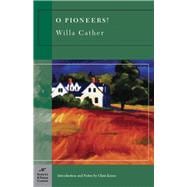
Note: Supplemental materials are not guaranteed with Rental or Used book purchases.
Purchase Benefits
What is included with this book?
| List of Illustrations | p. vii |
| Introduction | p. ix |
| Acknowledgments | p. xxv |
| Note on the Text | p. xxvii |
| The Text of O Pioneers! | p. 1 |
| Contexts and Backgrounds | |
| Autobiographical and Biographical Essays | p. 137 |
| From Willa Cather: A Memoir | p. 137 |
| Willa Cather Talks of Work | p. 152 |
| The Vision of a Successful Fiction Writer | p. 156 |
| Interview with Willa Cather | p. 160 |
| Willa Sibert Cather | p. 167 |
| Daughter of the Frontier | p. 170 |
| Preface | p. 176 |
| My First Novels | p. 178 |
| Literary Contexts | p. 181 |
| Peter | p. 181 |
| A Wagner Matinee | p. 183 |
| Review of Kate Chopin's The Awakening | p. 191 |
| [On Henry James] | p. 193 |
| From The Lesson of the Master | p. 194 |
| From The House of Mirth | p. 201 |
| The Willing Muse | p. 212 |
| Letters to Willa Cather | p. 222 |
| Miss Jewett | p. 225 |
| A White Heron | p. 233 |
| From Alexander's Bridge | p. 242 |
| The Bohemian Girl | p. 246 |
| [On Walt Whitman] | p. 283 |
| Pioneers! O Pioneers! | p. 285 |
| The American West | p. 289 |
| Letters of Mattie and Uriah Oblinger | p. 289 |
| Nature Frowns on Mankind | p. 320 |
| From The Significance of the Frontier in American History | p. 327 |
| Nebraska: The End of the First Cycle | p. 331 |
| Swedes in Nebraska | p. 338 |
| Bohemians in Nebraska | p. 340 |
| Bohemian Cemeteries in Nebraska | p. 344 |
| From Pastoralism and Its Discontents: Willa Cather and the Burden of Imperialism | p. 346 |
| Criticism | |
| Contemporary Reviews | p. 357 |
| O Pioneers! A New Heroine and a New Country Appear | p. 357 |
| A Good Novel | p. 358 |
| Books of the Day | p. 359 |
| Review of O Pioneers! | p. 360 |
| Review of O Pioneers! | p. 361 |
| [Review of O Pioneers!] | p. 363 |
| A Novel without a Hero | p. 365 |
| Modern Critical Views | p. 366 |
| [Willa Cather and the Epic] | p. 366 |
| [Biblical and Literary Contexts in O Pioneers!] | p. 373 |
| [Gender and Creativity in O Pioneers!] | p. 379 |
| Female Sexuality in Willa Cather's O Pioneers! and the Era of Scientific Sexology: A Dialogue between Frontiers | p. 396 |
| [O Pioneers! and the Cultural Politics of the Progressive Era] | p. 415 |
| The Enclosure of America: Civilization and Confinement in Willa Cather's O Pioneers! | p. 417 |
| [Willa Cather and the Pioneer Myth in O Pioneers!] | p. 441 |
| A Chronology | p. 453 |
| Selected Bibliography | p. 457 |
| Table of Contents provided by Ingram. All Rights Reserved. |
The New copy of this book will include any supplemental materials advertised. Please check the title of the book to determine if it should include any access cards, study guides, lab manuals, CDs, etc.
The Used, Rental and eBook copies of this book are not guaranteed to include any supplemental materials. Typically, only the book itself is included. This is true even if the title states it includes any access cards, study guides, lab manuals, CDs, etc.
Excerpted from O Pioneers! by Willa Cather
All rights reserved by the original copyright owners. Excerpts are provided for display purposes only and may not be reproduced, reprinted or distributed without the written permission of the publisher.